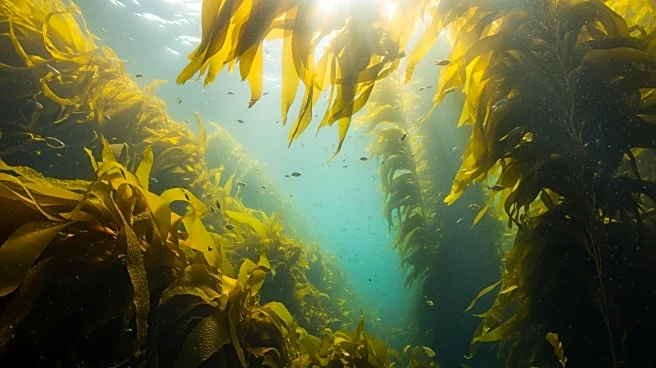What's Happening?
Recent research has focused on enhancing kelp productivity through restoration and assisted adaptation interventions in response to ocean warming. The study, conducted along the Western Australian coast, measured kelp productivity at three locations over
a year. Researchers used environmental data, including temperature and photosynthetically available radiation, to assess factors influencing kelp growth. The study found a significant relationship between kelp productivity and temperature, suggesting that temperature plays a crucial role in kelp physiology. The research aims to improve kelp productivity under future ocean warming scenarios by utilizing downscaled sea surface temperature data from global climate models.
Why It's Important?
Kelp forests are vital marine ecosystems that provide habitat and food for numerous marine species. Enhancing kelp productivity is crucial for maintaining biodiversity and supporting fisheries. As ocean temperatures rise due to climate change, understanding how kelp productivity can be improved is essential for ecosystem resilience. The study's findings could inform conservation strategies and help mitigate the impacts of climate change on marine environments. By improving kelp productivity, the research contributes to efforts to preserve marine biodiversity and sustain economic activities dependent on healthy ocean ecosystems.
What's Next?
The study suggests that further research is needed to explore the long-term impacts of ocean warming on kelp productivity. Future studies may focus on developing more effective restoration techniques and exploring the potential for assisted adaptation interventions. Additionally, policymakers and conservationists may use the study's findings to implement strategies that enhance kelp productivity and protect marine ecosystems. Collaboration between researchers, governments, and environmental organizations will be crucial in addressing the challenges posed by climate change and ensuring the sustainability of marine resources.
Beyond the Headlines
The study highlights the importance of considering multiple environmental factors when assessing kelp productivity. It also underscores the need for interdisciplinary approaches to address complex ecological challenges. By integrating climate models and field data, researchers can develop more accurate predictions and inform policy decisions. The research contributes to a broader understanding of how climate change affects marine ecosystems and emphasizes the need for proactive measures to safeguard biodiversity.















